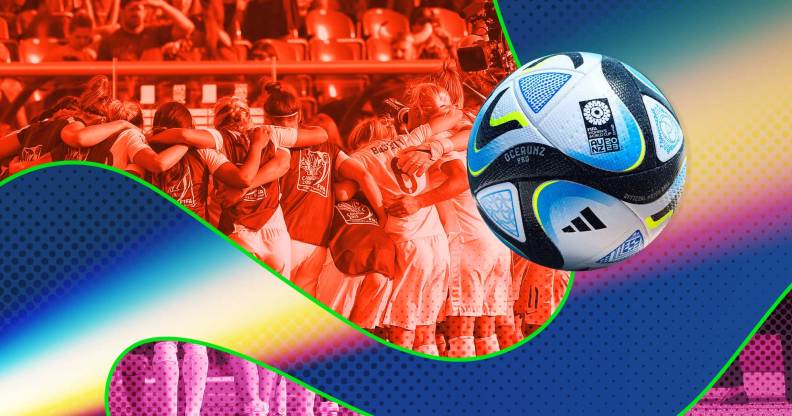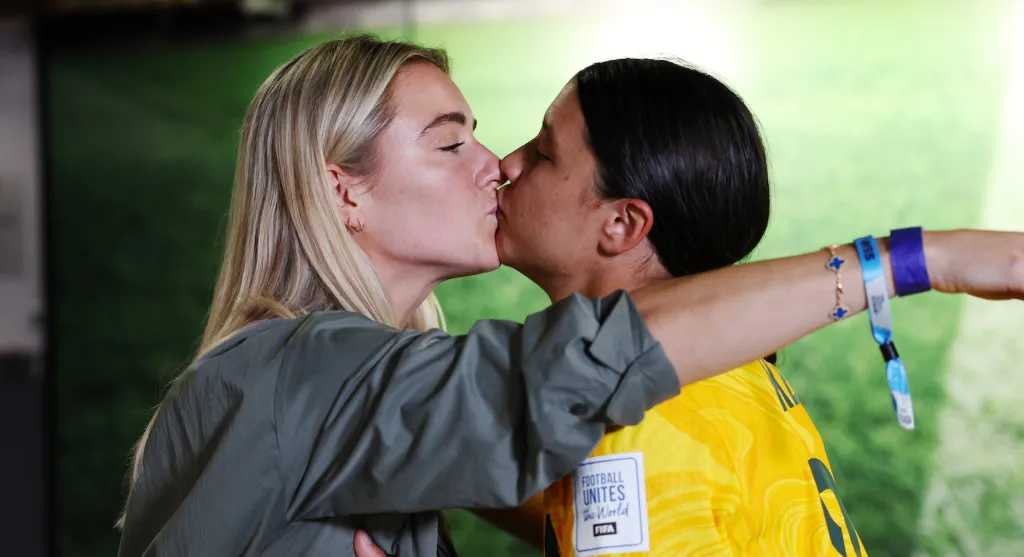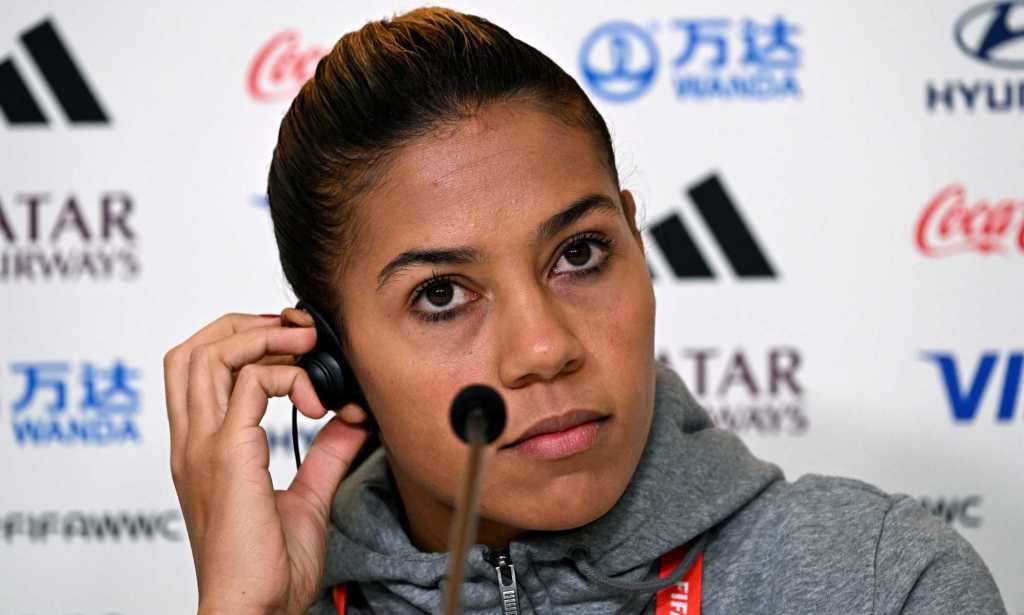Why misconceptions about LGBTQ+ women footballers could be damaging the game

Experts have warned of damaging impact of overestimating how many LGBTQ+ players there in women’s football. (Credit: Getty Images)
This year’s Women’s World Cup was a record outing for LGBTQ+ players and put queer inclusion at the centre of the world’s biggest footballing stage, but misconceptions about LGBTQ+ footballers could be harmful to the future of the women’s game.
For many queer women, and wider members of the LGBTQ+ community, the women’s game has long been a safe and inclusive space which is free of the homophobia, racism and sexism of the men’s game.
Out and proud lesbians have been able to thrive in women’s football, with the first fully lesbian club – Hackney Women FC – now kicking the ball around for nearly 40 years. Teams like this have given queer women the opportunity to come together and socialise free of stigma and shame, all while playing the game they love.
Despite the long-held inclusivity within women’s football, misconceptions and stereotypes still held by the wider general public about LGBTQ+ footballers could be detrimental to the future of the sport.
In essence, there is an anecdotal overestimation of the number of queer women who play football which reinforces the archaic assumption that ‘all female footballers are lesbians’. Particularly, within this, that women who play football always present as butch.
The risk is, that due to negatively held views about LGBTQ+ people both in different parts of the world and in communities within pro-LGBTQ+ nations, it will put future talent off from getting involved in women’s football because they fear facing homophobic backlash or negative stereotyping.
Summarising her Masters dissertation in the area, Lydia Scobie, junior digital product manager at Chelsea, said: “The over-representation of gay women in the game is most commonly explained by ingrained gender expectations.
“Sport is seen as an ideal arena for the display of sex and gender relations, and the use of the body so obviously reflects masculinity or femininity.
“Theorists have argued that female demonstrations of athleticism do not comply with orthodox rules regarding femininity, aggravate visions of masculinity and therefore homosexuality.”

Scobie notes that women participate in sports for a variety of reasons and it is reductive to assume that they do so to “express their sexuality and defy gender expectations”, before adding the key point that “many straight athletes are wrongly labelled as gay simply because they play”.
Prior to the tournament kicking off on 20 July in Australia and New Zealand, Outsports reported that the 2023 Women’s World Cup would feature the highest number of out players at any World Cup in history.
The sporting publication’s research found that nearly 12 per cent of the 736 players who competed this year openly identify as lesbian, bisexual, queer or non-binary.
These numbers are testament to the fact the women’s game has continually outpaced the men’s in terms of queer inclusion, with the number of openly LGBTQ+ players at this year’s World Cup a stark contrast to the zero at the 2022 men’s competition in Qatar.
Such figures, however, are perhaps below what the general population would estimate for a women’s football tournament, given the ongoing stereotype that all female footballers must be lesbians.
‘I was called a lesbian all the time by the boys’
In sports historian Jean Williams’ academic work A Game for Rough Girls?: A History of Women’s Football in Britain, she quotes one gay women’s player who said: “The image of women’s football on TV is that most women in football are gay, which is untrue, and that we are in it to escape our families, which is also untrue.”
Speaking with PinkNews, Hayley Wood-Thompson, a member of Cheshunt FC Women and a PE teacher, said she feels the on-going stereotypes are a “hang over” from the “ancient attitude” that all women who played football are masculine or gay.
“When I was growing up at school, I had so many comments thrown my way because I was one of the only girls that played football and so I was called a lesbian all the time by the boys, and obviously that was something they learned from home,” she said.
Whilst Wood-Thompson believes we are “breaking away from those stereotypes” – in part thanks to the success of England’s Lionesses – there are still attitudes which “feed into homophobia and could potentially put some people off”.
However, as a teacher, she is seeing a change happening in real time where women’s football is increasingly becoming a “cool and exciting” thing for youngsters to get involved with.
“Girls’ football in our school is huge,” she said.
“It’s probably one of our most popular sports in the winter, and girls are not put off because they think it’s masculine anymore, whereas for me – it was very different.”
Stereotypes make LGBTQ+ players in anti-LGBTQ+ nations vulnerable
Given the hostile attitudes towards the LGBTQ+ community that are still present in certain countries, communities and homes of aspiring youngsters, stereotypes pose the risk of putting women off from playing football due to the potential for negativity.
A BBC journalist was recently condemned for asking an invasive question at a Women’s World Cup press conference to Ghizlane Chebbak, captain of the Morocco team.
Chebbak reacted in stunned silence to a question about how many players on the team were LGBTQ+. In Morocco, homosexuality can be punished with a prison sentence of anything between three months and six years, and there are no protections from discrimination for the queer community in the North African country.

During the 2023 Women’s World Cup, author and academic Anima Adjepong wrote for The Guardian about the hyperfixation on player’s sexualities in countries such as Ghana, and how this can also be a form of sexual harassment.
“The progress that women’s football has made across the African continent is thrilling to see,” Adjepong wrote. “But right now, a slate of anti-queer legislation is sweeping the continent, and sports authorities have remained largely silent.
“Queer people are often not the majority on women’s football teams, yet the broad brush with which these teams are painted means that most players experience prying questions about their sexuality.
“In a hostile political and cultural climate, these questions can be dangerous, as highlighted by the incident for which the BBC has had to apologise.”
Fears about getting involved in the sport due to homophobic attitudes could result in countless extremely gifted players not entering the talent pool, potentially impacting the game at club and international level.
At a time when women’s football is growing rapidly around the globe, both in terms of girls and women getting involved in the sport and fans supporting their local and national teams, young people being put off by anti-LGBTQ+ attitudes and stereotypes would be a tragedy.
How did this story make you feel?

